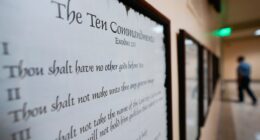Share this @internewscast.com
President Donald Trump attends a meeting with the Fraternal Order of Police in the State Dining Room of the White House, Thursday, June 5, 2025, in Washington (AP Photo/Alex Brandon).
A federal judge in San Francisco has issued a significant ruling, halting a controversial move by the Trump administration to lay off federal workers amidst the ongoing government shutdown. This decision was handed down on Wednesday by U.S. District Judge Susan Illston, who was appointed by former President Bill Clinton.
Judge Illston’s bench ruling specifically blocks the implementation of “reductions in force” (RIFs) that the Trump administration had proposed. These reductions were initially suggested at the end of the previous month, just days before the shutdown began, with the aim of cutting down the number of federal employees.
The court strongly criticized the proposed mass layoffs, describing them as politically driven and exceeding the confines of executive authority. According to a report by Politico, Judge Illston remarked that the administration appears to be exploiting the government shutdown to bypass legal constraints and impose preferred structural changes.
Furthermore, the judge declared these intended layoffs “illegal and in excess of authority,” a sentiment echoed in a courtroom report by Bloomberg Law.
This legal challenge, filed on September 30, was brought forth by the American Federation of Government Employees. This union represents a significant number of federal workers across various government agencies, all of whom stood to be impacted by the proposed layoffs. More details on the case can be found through the court records.
The underlying Sept. 30 litigation was filed by the American Federation of Government Employees, which represents thousands of federal workers assigned to various federal agencies.
In their 31-page complaint, the plaintiffs asked for injunctive relief under the Administrative Procedure Act (APA), the federal statute governing agency behavior. On Oct. 4, the labor union plaintiffs filed a 29-page motion for a temporary restraining order.
“In contravention of binding authority, even before the shutdown began, the Administration announced its plan to engage in mass terminations of federal employees — not temporary furloughs, but permanent reductions-in-force — during the shutdown,” the second filing reads. “And now, it has become clear that those threats have become action and will soon be carried out.”
Motions practice has been quick due to the presumed speed with which such layoffs might be effectuated – a rapidity singled out by the plaintiffs in their restraining order request. Indeed, in their own haste, U.S. Department of Justice attorneys filed an error-filled motion in opposition, prompting the subsequent filing of an errata notice – a formal document admitting to, and correcting, certain mistakes.
Over the weekend, Illston set the date for the hearing, which ended with the court blocking the government from “taking any action” that might result in RIFs being issued to workers represented by the AFGE.
The lawsuit noted the plans to fire government workers were previewed in a memorandum issued by the Office of Management and Budget (OMB), which advised all administrative agency heads to “use this opportunity” to reduce staff.
During the hearing, the judge listed public comments made by President Donald Trump, Vice President J.D. Vance and OMB Director Russ Vought. Those comments, the court noted, evidenced a desire to attack and dismantle programs supported by the Democratic Party.
“It’s really ready, fire, aim on most of these programs,” Illston opined on Wednesday. “It’s a human cost that cannot be tolerated.”
The government, in its opposition motion and during the hearing, argued the plaintiffs do not have standing to sue because the harms they describe are too speculative – insisting the OMB memo is not actually binding on any federal agency.
“Many of them may well decide not to do RIFs at all,” DOJ attorney Elizabeth Hedges argued – to little effect.
The judge rejected that line of thought, upbraiding the DOJ for attempting to make its case only on jurisdictional issues.
“You’re not making any statement concerning the government’s position on the merits…whether the RIFs are legal?” Illston asked.
To which Hedges replied: “Not today, your honor.”
“You’re not going to get to the merits with me today because the merits are just so troublesome,” Illston intoned.















